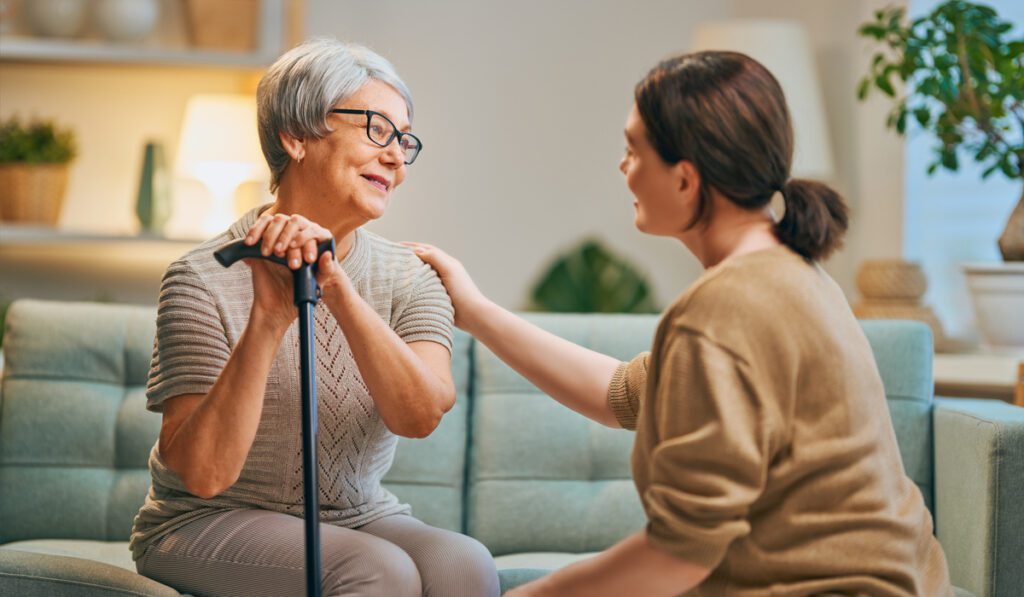
If you’re helping a loved one with daily tasks or looking into home care services in New York, you’ve probably heard the terms caregiver and Personal Care Assistant (PCA).
While both provide support for older adults or individuals with health issues, they’re not exactly the same. Here’s a detailed look at what separates a caregiver from a PCA, especially when it comes to in-home care through Medicaid or a home care agency.
Key Takeaways
- A caregiver is often a family helper with flexible tasks, while a PCA is trained for personal care.
- Caregivers may have no formal training, but PCAs complete required programs and follow a nurse’s care plan.
- Caregivers are usually unpaid, while PCAs are paid professionals working through Medicaid or a care agency.
- Agencies like Friends & Family Home Care can help you choose care and offer support with Medicaid and CDPAP options.
Caregiver vs. PCA: Key Differences
To make it easier to see which role fits your home health care needs, we’ve put together a table comparing caregivers and PCAs, sometimes called personal care aides.
| Role | Caregiver | Personal Care Assistant |
|---|---|---|
| General term or specific role | General term, often informal | Specific role with formal training |
| Scope of Tasks | Tasks vary, often basic support | Focused on hands-on personal care |
| Compensation | May be unpaid (family help) | Paid professional, often via Medicaid |
Now that you’ve seen the side-by-side comparison, let’s go deeper into the details.
There are several important differences between a caregiver and a PCA that go beyond just titles. Below, we break down the differences in more detail.
Definition and Role
A caregiver is a broad term that can apply to anyone helping someone else—often a family member—with everyday life.
They might assist with running errands, provide emotional support, or help with light housekeeping. Their role depends on the individual’s situation and their skills or comfort level.
PCAs are trained to help with ADLs (activities of daily living) such as bathing, dressing, and mobility support.
They are often employed through a home care agency or Medicaid program. They focus on improving the client’s well-being and quality of life by offering consistent, hands-on help.
Training and Certification
Many caregivers—especially unpaid family members—don’t have formal training. Some learn through hands-on experience, while others may take optional classes.
PCAs must complete a training program that teaches them how to assist safely with personal care, observe vital signs, and understand basic medical tasks within their role. For some, a high school diploma may be required.
In New York, this training is regulated, and they often work alongside healthcare professionals like registered nurses (RNs) and certified nursing assistants (CNAs).
Types of Tasks Allowed
Caregivers may help with household tasks, meal preparation, or simply offer companionship. They are usually not allowed to assist with medical procedures or medical assistance unless trained.
PCAs are trained to provide personal assistance, including toileting, bathing, grooming, and mobility support. While they do not perform medical procedures, they can assist with medical equipment and monitor vital signs as part of a care plan.
Supervision and Care Plans
Caregivers generally don’t work under any formal supervision. They might follow informal instructions from the family or client.
PCAs work under the supervision of a registered nurse who develops individualized care plans based on the person’s healthcare needs. This ensures that in-home care is consistent and tailored to the individual’s condition.
Payment and Employment
Caregivers are often unpaid, unless enrolled in a program like the Consumer Directed Personal Assistance Program (CDPAP), which allows family members to receive payment for providing home care.
PCAs are typically employed by a home care agency or under Medicaid. They are compensated for their work and provide structured support to ensure the client receives proper personal care and attention.
Work Settings
Caregivers may offer support in private homes, care facilities, or assisted living facilities. The setting depends on the caregiver’s relationship with the client and their living situation.
PCAs typically provide in-home care, allowing clients to remain safely in their own homes rather than moving into nursing homes or care facilities. Their work helps older adults maintain independence while receiving needed help.
Need Help Choosing the Right Care?
If you’re feeling unsure about whether a caregiver or PCA is right for your loved one, let’s connect.
At Friends & Family Home Care, we specialize in matching clients with PCA and HHA (Home Health Aide) support that meets their specific needs. Whether your loved one needs help with ADLs, household chores, or medical care, we’re here to guide you every step of the way.
Let us help you bring compassionate, reliable home care services into your loved one’s own home—improving their well-being and easing your peace of mind.
Contact us today to get started.